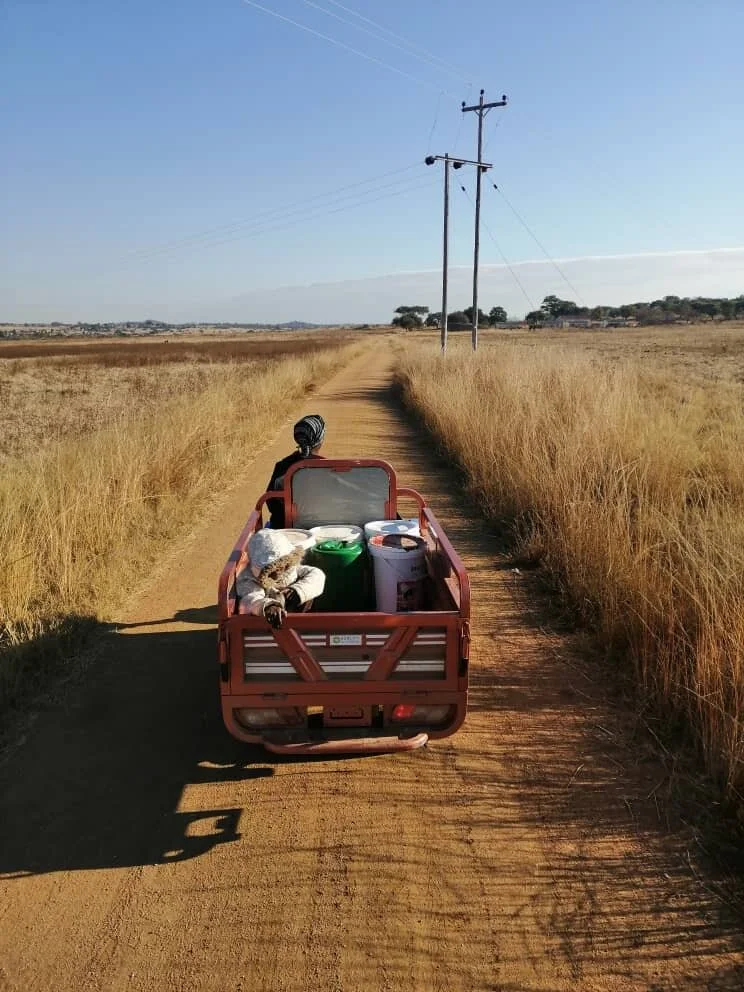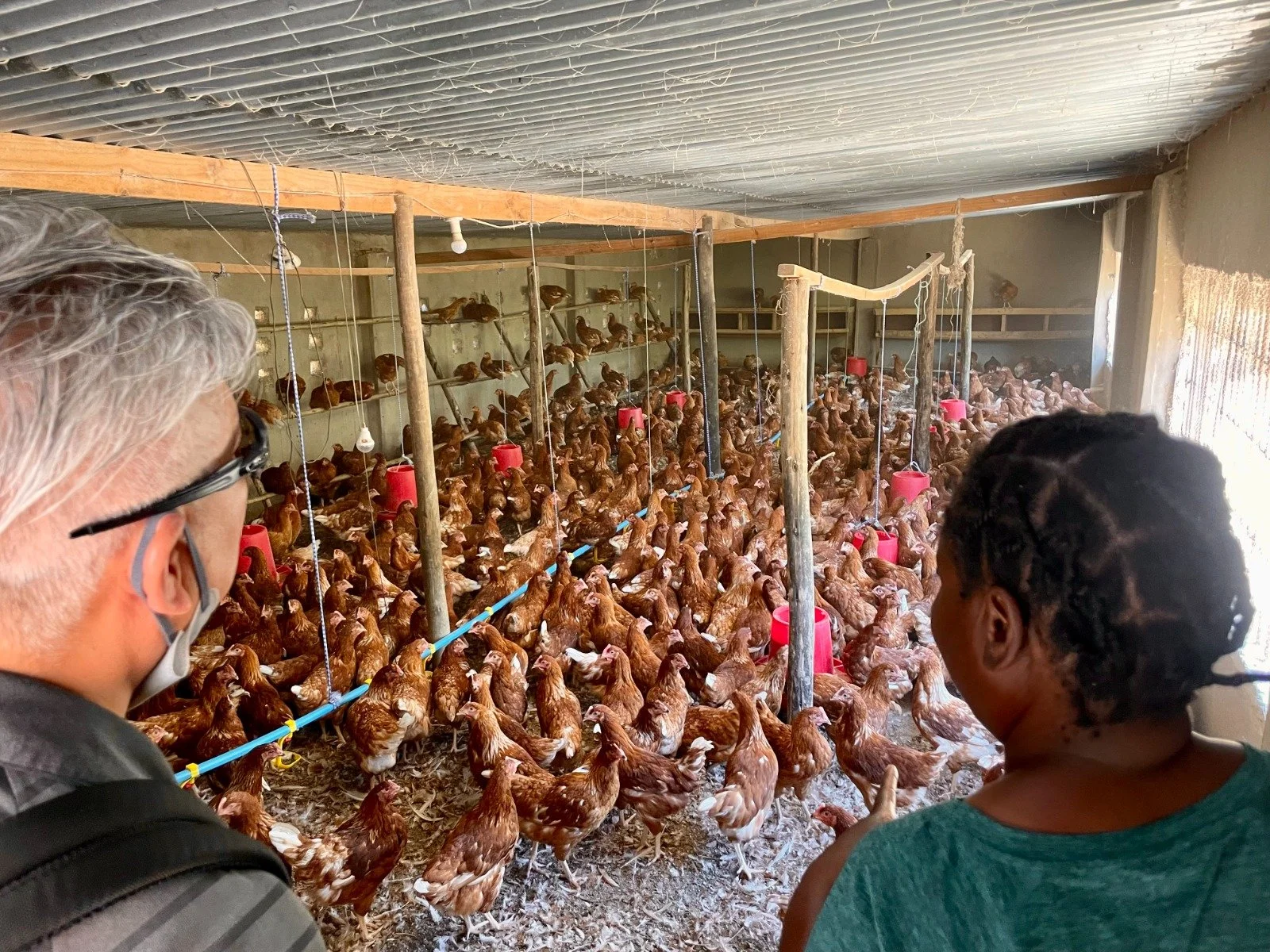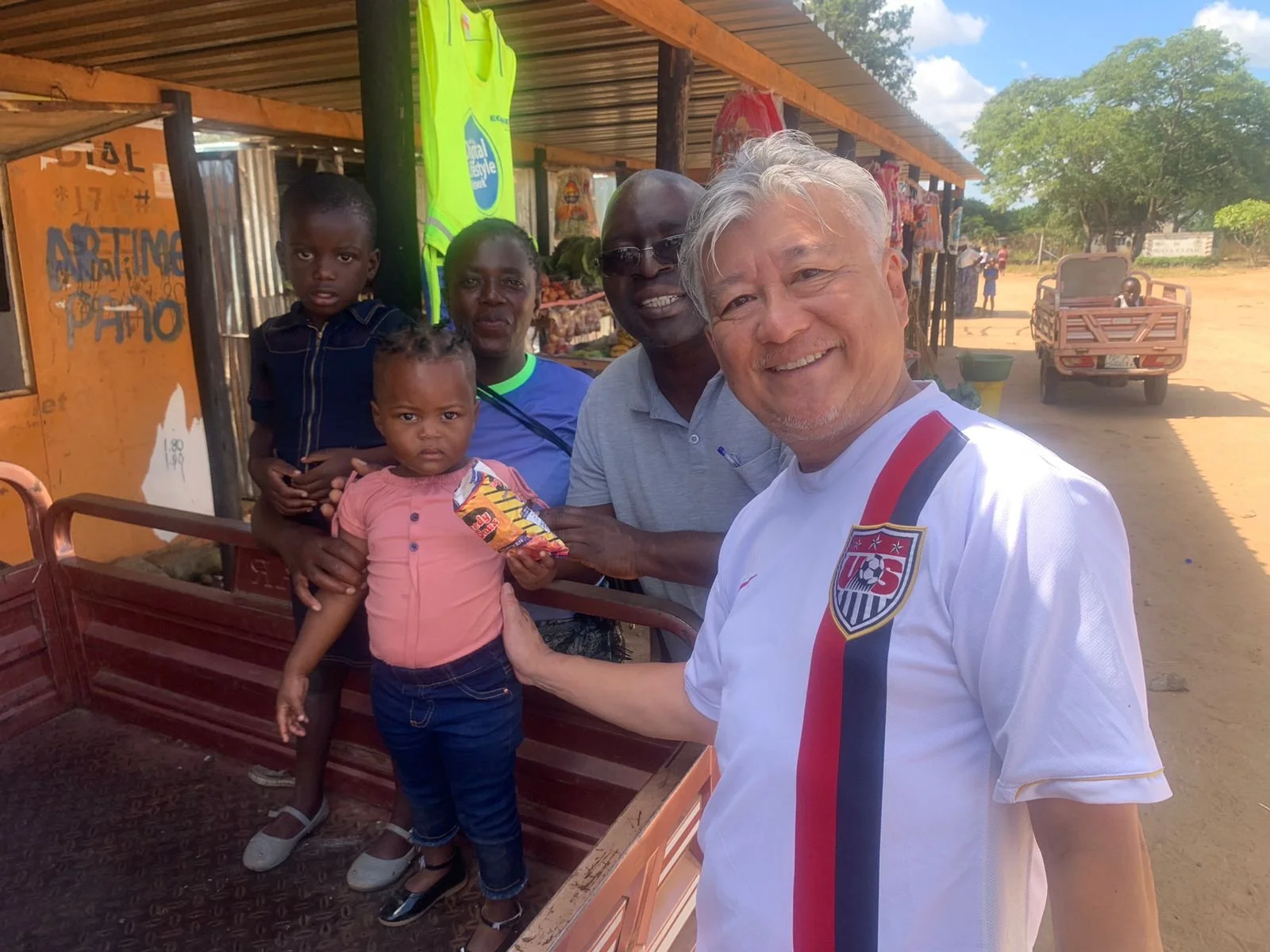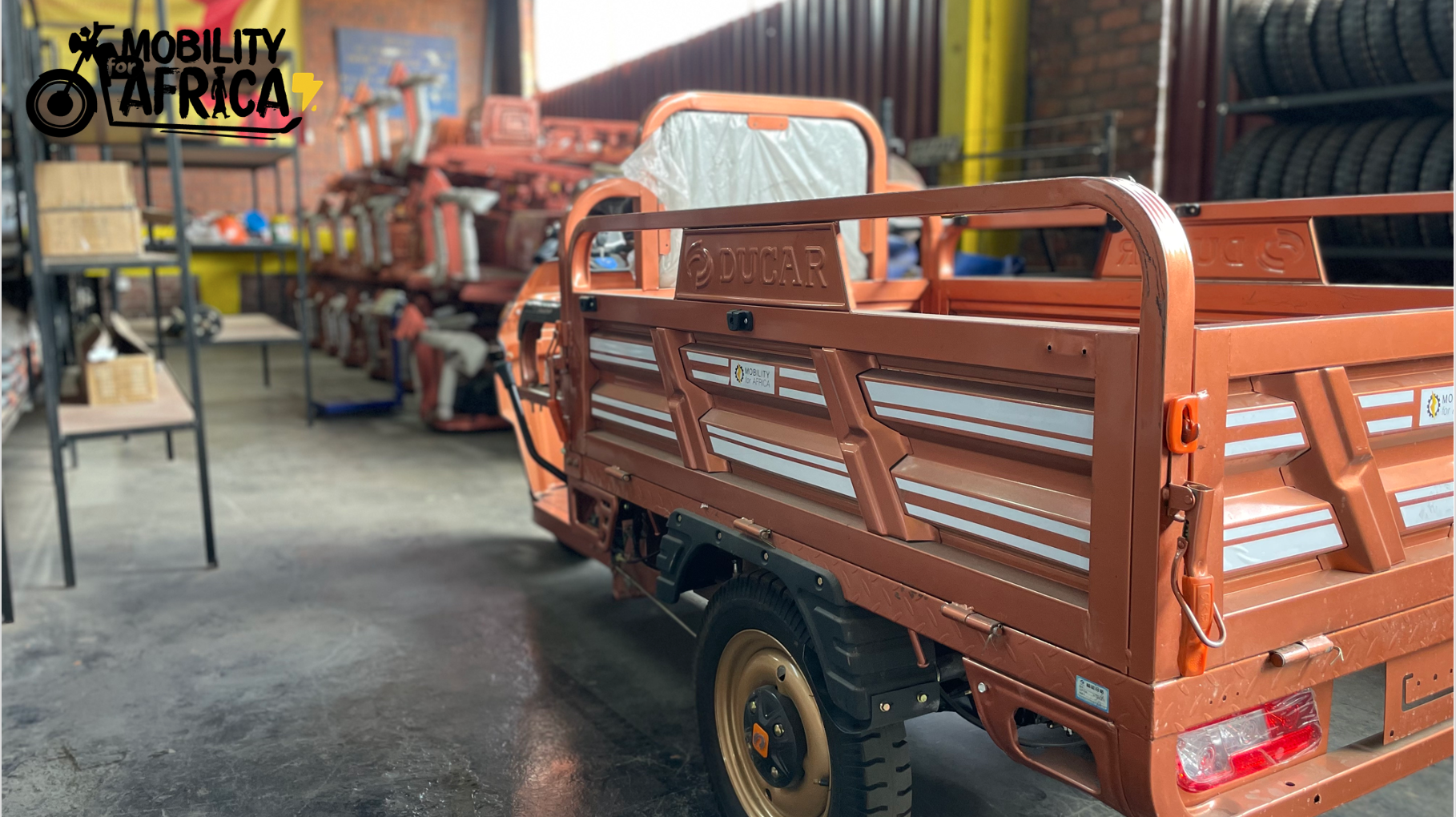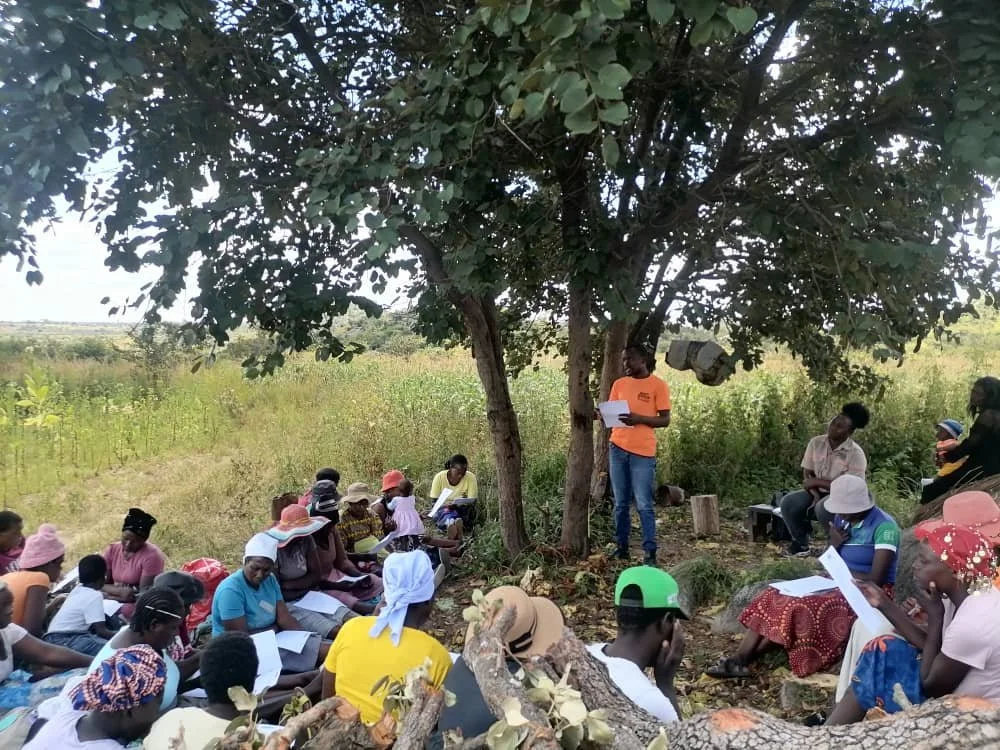Image by Steven Chikosi | Ashden
Introducing Anesu and Pamela
Introducing Pamella and Anesu, our two new technicians to the team! They joined us at the Chipinge Dairibord Charging station in June.
All our technicians are trained on the job in battery swapping, monitoring the solar charging station, Hamba maintenance and recording of power generation among other tasks.
In Zimbabwe, 2/3 of the country’s population lives in rural areas
2/3 of the population are below the age of 25 years.
The Zimbabwe Green Jobs Assessment Report (2021) estimates that by 2035 there could be an additional 350,000 green jobs specifically created by renewable energy policies.
MFA aims to create more formal employment by encouraging hands-on experience so we are ready for a transition to the green economy.
“We can’t roll out e-mobility if we continue to work in silos. [Mobility for Africa] is building local skills and developing the practical skills we need to transition to green mobility. They have massive potential for job creation” says Shantha Bloemen, MFA’s founder and CEO.
Electric mobility provides a great developmental potential for Africa including the creation of “green jobs”; providing additional employment opportunities to assemble and manufacture vehicles and be part of the lithium -ion battery value chain.
The importance of Climate Financing
Yesterday, Shantha Bloemen, our CEO, joined a United Nations Development Programme - UNDP side event as part of a Green Waste and Energy Expo in Harare.
The session was intended to be part of building momentum on Zimbabwe’s Nationally Determined Contributions (NDC) and Long-Term Low Emissions Development Strategy (LT-LEDS) Investment Plan that will develop sectoral roadmaps, including for the waste and energy sectors.
Zimbabwe alone estimates it will need $7.8 billion of climate investment to reach the NDCs.
Achieving the National Determined Commitments (NDCs) to reduce a 40% per capita emissions reduction across all sectors of the economy by 2030 and National Climate Plan will depend on concrete projects, measures and activities to create concrete mitigation and adaptation plans.
The panel discussion moderated by Eng. Lewis Makurumure, from UNDP, along with Dr Dingane Sithole (PhD), the Executive Director of the Business Council for Sustainable Development and Dr Solsten Ziuku, from the Ministry of Energy & Power Development highlighted how there needs to be a focus on:
• Creating new business models
• Leveraging both private and public investment
• Investing in green energy generation
• And rethinking how we consume energy to create more linkage to inclusive shared solutions that focus on productivity rather than consumption.
As the global weather patterns indicate, climate change is real, happening fast and will have severe consequences. The increase in Zimbabwe’s mean annual temperatures could potentially exceed 3°C by 2050, depending on the actual global emissions pathway achieved (ICLEI Risk and Vulnerability Assessment Report: 2020).








Hamba roll-outs continue...
6 new Hambas rolled out in Wedza, Zimbabwe this Thursday (27th July 2023) 🎉
With 6 hambas comes:
18 new certified drivers;
100% women
With the support from InfraCo Africa we are bringing the e-mobility revolution to rural Africa one hamba at a time!
Providing transport will save time previously spent travelling on foot; increase access to social services; enhance current economic activities and much more…
#womendrivers #sustainablesolutions #emobility #ruraltransport
A tribute for Felicity Tawengwa
Tribute for Felicity Tawengwa
A year after our co-founder Felicity Tawengwa passed away, Mobility for Africa’s team joined her family for her memorial. As part of celebrating Felicity and her amazing commitment to rural women, we marked the occasion by opening the Felicity Tawengwa training centre at our initial pilot site at Shaka Hills Farm. This centre will remain at the forefront of testing new technology, transferring practical skills to young Zimbabweans in energy, battery management and electric mobility.
In the next year, with support from Toyota Mobility Foundation, we will be collaborating with Shaka Hill to work to help improve access to markets for rural women. By combining mobility and agricultural support, and creating a hub where local farmers can sell their produce, we plan to improve rural incomes for women and their families by giving them access to better markets for their produce.
This was part of the vision Felicity had. She was committed to rural Zimbabwe and believed we can be part of building a vibrant resilient continent.
We still miss her every day but are inspired to work even harder to achieve her vision.
Pauline, a dairy farmer in Chipinge
“I almost cried with joy the day I received the Hamba” - Pauline Ndlovu
Pauline has 3 dairy cows and has had the Hamba since roll-out in Chipinge mid 2022. Before the Hamba, her journey to and from the milk collection centre took about 3 and 1/2 hours!
The milk canister is 5kg when empty, and up to 26kg at maximum capacity. Pauline’s route to milk collection: 7km across elevated terrain.
Milk collection is twice daily meaning she would have spent up to 7 hours transporting milk. Only 5 daylight hours would remain to do any other economic activities, carry out domestic chores and tend to her cows.
Now, it only takes her only around 30 minutes each way, and she doesn’t have the arduous task of balancing the canister on her head.
Further Hamba benefits:
💰 Pauline also now transports milk for 5 of her neighbours and earns extra income in doing so.
🐮 She uses the Hamba to transport food for her cows and manure to the fields, saving on additional help she used to hire.
🏫 Additional income from the Hamba has helped her to pay for her children’s education tuition.
Pauline was featured in the iNewsTV Article by Farai Shawn Matiashe earlier this year “‘A lifesaver’: How electric tricycles are revolutionising the lives of Zimbabwean farmers” (read here).
See images of Pauline below ⬇ by Steven Chikosi who visited our site in Chipinge recently.
#helpfulhamba #makingtransportaccessible #renewableenergysolutions
Women Drivers: Why don't we have more women in the driver's seat?
As an extension of our collaborative Art Exhibition “Women, Power & Mobility” with Nhaka Gallery, the conversation highlighted the importance of mainstreaming gender in transport.
We were lucky to have a great range of panel Members:
🗣 Engineer Chingosho Hilton, lecturer at UZ in department of Electrical and Electronics Engineering.
🗣 Sikhanyisiwe Mlotshwa-Gumbo, Managing Director of Melonpine Transport & Logistics which provides commuter transport.
🗣 Patience Chikokoko, owner of a business of commuter omnibuses.
🗣 Melody Zvakere, Poultry farmer and Hamba driver in Domboshava.
🗣 Angeline Dimingo and,
🗣 Sarudzai Mukungunurwa - both qualified truck drivers and members of the Zimbabwean Women Driver’s Trust
And the discussion was moderated by Mobility for Africa founder, Shantha Bloemen.
The discussion spotlighted the discrimination women face in transport and several propositions were made:
➡ The need for a mindset change; changing the gender bias associated with driving and managing transportation.
➡ Women should be encouraged and facilitated; information dissemination on opportunities available for women to get them in the driver’s seat.
➡ Communication and networking of organisations.
Work with associations to capacitate drivers: capacity building, training and coaching.
We were also honoured that the Ambassador of Indonesia to Zimbabwe was able to attend. He shared his experiences from Indonesia and how women and been a big part of their micro-mobility revolution.
We’re hoping this discussion is just the beginning of the conversation to get more women in the driver’s seat.
DAP Funded Charging Station
We were honoured to have the Ambassador of Australia to Zimbabwe, Minoli Perera, open our new solar charging station in Chipinge, Zimbabwe.
The station is strategically positioned at our partner’s, Dairibord Zimbabwe, factory to help service more small-scale dairy farmers around Chipinge, enabling them to sell their milk and increase their incomes.
As well as the Dairibord and Australian Embassy team, it was also great to have members from the Zimbabwean Association of Dairy Farmers (ZADF) and We Effect, who continue to support our operations, and the local government representatives, to mark the occasion.
We are extremely grateful to Australian Embassy, Zimbabwe DirectAidProgram for their support and funding of the new site.
Servicing Hambas ♻️🛠️
REUSE & UPGRADE:
As we assemble and roll-out new Hambas we’ve also been bringing the 1st Generation Hambas to the factory for some TLC!
1st Generation Hambas have been active since our launch in 2019. They came with components suited to flat roads in good condition. We subsequently made modifications to make them more robust to combat the conditions of rural African, weathered-terrain.
However, like all vehicles, they sometimes need a full service!
From a fresh coat of paint or wheel changes to working on the brake and suspension system, the team have been working to repair, refurbish and return Hambas for use at sites.
The Hambas are also serviced on-site regularly. Every time a Hamba leaves the charging station from the battery swap our technicians ensure they are off-road worthy!
Hamba roll-out
Off they go! HAMBA!
We are in the process of rolling out our Hambas in batches of 10. At the end of May we started with a fresh batch to our site in Wedza, Zimbabwe supported by our investment from InfraCo Africa.
10 new Hambas. What will their impact be?
☀️ Solar-powered electric transport from our purpose-built charging stations: brings a climate-conscious, sustainable and affordable alternative to diesel/ petrol vehicles. SDG7 & SDG13
⌛️Save time previously spent travelling on foot:
- Time saved can be invested in economic activities SDG1
- Save health from carrying heavy loads over long distances SDG3
🏥 Increase community’s good health & well-being with new transport & logistics drivers transporting community members to and from the clinic SDG3
💰Enhance current economic activities:
e.g FARMING: transport, with a greater carrying capacity than by head, increases access to markets and lands, increases productivity, and increases income SDG1
📈Provide a new revenue stream by directly employing Transport & Logistics Drivers SDG8
🌽Food security: the Hamba’s 400kg carrying capacity ensures food produced by small-scale horticulturalists reaches the market. No more food waste! SDG2
🙋🏿♀️20 new #womendrivers SDG5
#ruraltransport #sustainabledevelopment #socialimpact #makinganimpact #scalingup
New Transport & Logistics Driver during Hamba Operator training
Driving Lessons
HAMBA DRIVER TRAINING ✅
“Whether you have been driving before or not, you can learn how to use the Hamba. It’s just confidence”, explained January, one of the technicians on the training team.
Last week January and Clever trained 10 women; 5 transport and logistics groups in Wedza. Driving lesson are included in our services, along with maintenance and management of battery swapping, so they’ll be the first of many drivers trained as we progress to rolling out the Hambas.
The Hamba operator curriculum is divided into theory and practical learning (check out photos from the practical sessions below ⬇ ).
“Only one of the women had driven before, her husband has a car and had taught her how to drive it.
For the others, some were fast learners, and some slow, but we’re happy because they’re all ready to pass”, explained January.
The final test includes a practical driving element and a verbal theory test, to make it accessible to everyone. And the top priority for our team is ensuring a safe and friendly environment to learn.
We’re thrilled to see the first few groups of women learning and getting familiar with Hamba. Look out for more updates on our newly qualified Hamba operators and see them out and about!
#driving #womendrivers #transportsolutions #emobility #renewableenergysolutions
ADMA Agricultural Show
ADMA AGRICULTURAL SHOW 👩🌾 🌾
Last week we were invited by Solar Shack to join their stand at ADMA Agricultural Show!
The annual ADMA Agrishow is an opportunity for all companies in the agricultural sector to exhibit their products and services on static displays with on-stand demonstrations. There was such a variety of stands from heavy machinery, inputs, clothing and our Hamba and bespoke charging station!
We were presenting our smaller fleet option (at least 3 Hambas) powered by our purpose-built charging system (including 5 of our bespoke batteries).
With our strong rural and agricultural focus, it was great to be represented for the first time by the team: Rumbie, Gawain and Amelia.
If you didn’t see us there or want more information please get in touch via email at info@mobilityforafrica.com!
Infraco Africa HSES Visit
We had the Health, Safety, Social and Environment (HSES) team from our investing partners at Infraco Africa on the ground in Zimbabwe to deliver training and materials on Private Infrastructure Development Group’s life saving rules to keep people safe.
Ridouan LERHRISSI and Jacob kazungu from Infraco led the the workshops and also present the materials for the official handover to Rumbie, our Assistant Engineer, and HSES Coordinator!
And Alex Traube-Childs presented the insightful sessions on #businessintegrity.
It was great to learn all the invaluable information to undertake as we grow and expand safely and with integrity!
Hamba facilitating banana sales
Majory Karimadondo, one of our Transport & Logisitcs drivers in Wedza, has been hired out for a day at a time by sellers.
“It’s much better to hire a taxi driver and sell all my bananas at once than to keep them in the house and selling in smaller quantities” - says the banana seller featured below.
Before, the seller would have had to sell in smaller quantities carrying all produce by foot.
Majory spent the whole day taking the banana seller to many communities and growth points to reach as many buyers as possible.
This is just one example of the creative, shared electric mobility solution that is tackling last mile delivery logistics to reduce harvest loss, keeping it to a minimum for perishables! Targeting SDG 2 - Zero Hunger: End hunger and achieve food security.
MFA Shortlisted for Ashden Awards
We are delighted to be shortlisted for the Ashden Award for Powering Agriculture for 2023.
The Ashden Awards bring publicity, grants and connections to outstanding climate solutions. Whether powering up off-grid communities, greening cities, or regenerating the natural world, our winners work to build a fairer and better zero carbon future.
Mobility for Africa has been shortlisted for the Ashden Award for Powering Agriculture: Tackling Hunger and Poverty in the Global South which is supported by UK Department for Energy Security and Net Zero.
We have been recognised for introducing the Hamba, a clean-energy solar powered electric-vehicle, to increase access to market, capacity to increase produce and decrease foodwaste, reducing food insecurity!
Zimbabwean International Trade Fair 2023
Last Week, Chingosho Hilton, Lisa Mare and Amelia Wilson represented Mobility for Africa at the Zimbabwean International Trade Fair.
It was the first time MFA has been represented at ZITF and we were grateful to be exhibiting at the Zimbabwean Ministry of Energy and Power Development, and showcased at AECF and UK Embassy in Zimbabwe stands.
The ZITF is a platform to promote, through exhibitions, local and international companies, stimulate networking, facilitate beneficial partnerships & explore policy opportunities. The theme this year was “Transformative Innovation, Global Competitiveness”.
Visit from Mr. Bizen, African Director of Toyota Mobility Foundation
Hitoshi Bizen, the African Director at Toyota Mobility Foundation, along with Thibaut MALLET DE CHAUNY and Olujimi Akindele from EIS were in Zimbabwe this week to visit Mobility For Africa operations. It was a busy week visiting each of our sites, meeting our diverse range of customers and learning about the rural transport needs of the country. While TMF was one of our first partners to support our initial pilot in Wedza to explore rural green mobility solutions for rural women, COVID had meant it was not possible for them to be on the ground since 2020.
In Domboshawa, a peri urban area, just outside of Harare, Mr. Bizen hitched a ride with one of our transport and logistics drivers, Kupakwashe. He then visited Mrs Makuwe’s homestead and poultry sheds, where he could see how last mile transport made it easier for her to travel to the local markets to collect chicken feed and seller her eggs.
In Wedza, Mr. Bizen met the local health staff at Igava Clinic to discover how the Hamba could be used to vaccinate children, bring pregnant women to the clinic and help the nurse check in with those living with HIV or TB to make sure they took their medicine. He also had a chance to see how this year, with their support, we will work Shaka Hills Farm, to improve the productivity of local farmers to grow horticulture and then better access local and international markets through their operations.
While in Chipinge, in the Eastern Highlands of Zimbabwe, Mr. Bizen got to learn about how a lack of last mile transport hindered the ability of small scale farmers to increase the milk they could sell. Pauline, who qualified for a lease to purchase of the Hamba, now can deliver her milk to the milk collection centre in under an hour, saving her hours each day she can use to instead grow feed for her cows to improve their yield.
TMF, along with other global partners, are crucial in continuing to equip us, to get one step closer to our goal: to bring an affordable, reliable, efficient and environmentally friendly transport solution to rural women and their families!
Preparing for Hamba assembly
The team are busy preparing to assemble and roll-out the first 50 Hambas to our sites in Zimbabwe. BUT, that is just the start of our short-term expansion plan which, supported by InfraCo Africa investment, will host 400 new hambas across rural Zimbabwe!
More hambas, more locations, more mobility.
Our local talented team of technicians will be working hard to assemble the Hambas while coordinating with our communityengagement team to ensure a successful and efficient roll-out... updates to come!
Electric mobility | Transportation | Up-skilling | Factory & production
The Hamba! More to come….
Building a shared fleet system
Shared mobility.
At MFA’s core, we believe in shared transport solutions. We aim to support a circular economy, by creating jobs, enhancing current livelihoods and improving mobility and productivity in a cooperative model.
So, how to build a shared fleet transport system?
The MFA team have been out in the field for the past two weeks carrying out our application process. People have been given individual application forms and an opportunity to feedback to their current partners on the opportunity or choose people they would be keen to start a group with.
Thandi, one of our community engagement and research assistants, explained, “Some people have been doing projects together before and they will come to us. For any group, newly founded or well-established, we get them to fill in a group application form to gather further background information including:
• Their types of projects and success
• How they will use the Hamba as a group
• Any additional activities they are involved in
• How much they would be willing to pay for the use of the Hamba”
Our current rental groups share a Hamba between as many as 5, as little as 2 and our transport and logistics work in pairs: 2 weeks on, 2 weeks off which gives time to focus on other economic or domestic activities.
Through our pilot projects, it’s clear that sharing the Hamba is a more efficient and economically viable for members of the community. The Hamba should always be on the move, after all, it means “let’s go”!
Meet Shumi
Get to know MFA Wedza Site Coordinator, Shumirai Tangwara!
Continuing celebrations of our 4th anniversary of our original pilot site this month, it’s time to shine a spotlight on Shumi who joined MFA when we first rolled out.
To start, Shumi had to learn how to drive the Hamba. She did our 5 day Hamba training course and then began working as a technician; managing and doing battery swapping and battery charging.
Throughout her first year she gained experience working with the community through performing communityengagement: learning how to interact, collecting information through application and group forms and helping train future drivers.
In 2021, Shumi was promoted to Site Coordinator. “At first I had a fear taking on that position, but I’ve made it!”, she said.
Having worked closely with these women these past 4 years, Shumi explained impacts of the Hamba that she’s observed:
“ The income of the ladies has increased. Before Hamba they only sold few of their products because they were having to transport by head, with the Hamba they carry as much as they want.
They are not losing money on perishable goods as they can go to the market much faster than when they walked.
And so many ladies are affording to pay their children’s school fees.
Some have even built houses with the extra income the Hamba has provided”
Shumi is a role model to members of the team and our other site coordinators. We’re very lucky to have such a strong and passionate MFA team!




